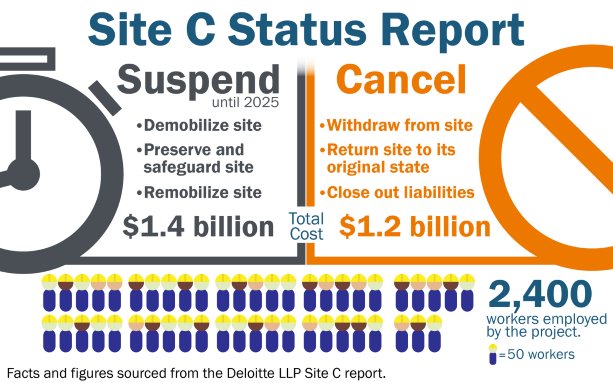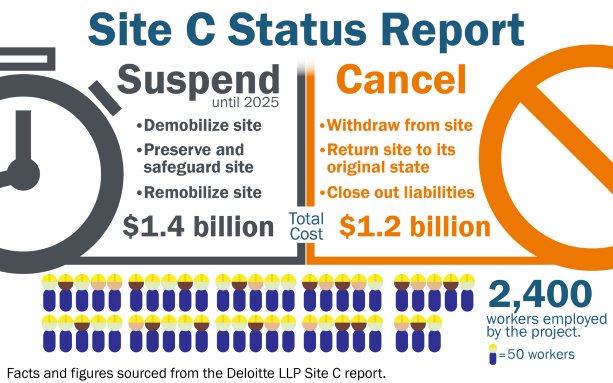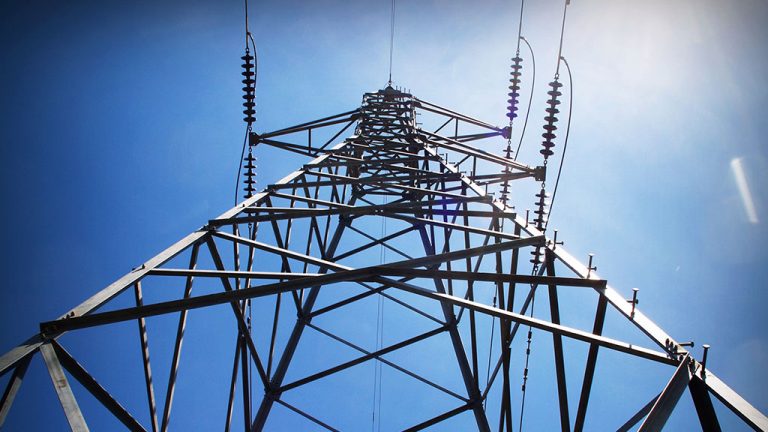While B.C.’s Site C dam is currently on budget and on time, it would be cheaper for the province to cancel the $8.8-billion hydroelectric project altogether rather than delay it, a new report commissioned by the BC Utilities Commission (BCUC) says.
The BCUC has been tasked by B.C.’s NDP government to conduct an accelerated review of the project, its costs and the financial risks of delaying, cancelling or continuing it.
The report by auditing firm Deloitte LLP concluded that pausing the project until 2025 would raise costs by $1.4 billion while scrapping it would cost $1.2 billion. The costs of cancellation would include BC Hydro withdrawing from the site, returning it to its natural state and close out liabilities.
According to the report, the project is currently on time and on budget, but there is a significant risk that that could change. Much of this hinges on the project team being able to start the crucial river diversion process on time.
"The likelihood of these scenarios will depend on the mitigations that the Project takes to address the risk of missing the Start of River Diversion and the risks of potential further cost increases in MCW or uncertainties of major contracts yet to be awarded," reads the report. "The project is facing significant schedule and cost pressures."
If the river diversion milestone is missed it could cause a year in delays. Deloitte estimated this could raise the costs from $8.8 billion to between $9.1 billion and $10 billion. The report noted that major risks including performance issues of contractors, unforeseen geotechnical conditions and cost risks associated with major contracts that have not been awarded yet.
Peace River Hydro Partners (PRPH) has run into geotechnical issues and one of its partners, Petrowest Corp., was cut from the partnership after being forced into receivership. It also remains to be seen how tension cracks in one of the river banks will impact work going forward.
"These risks could impact the cost and schedule performance of the project," reads the report. "Given that the Site C project is in the early stages of construction with over seven years to go before the ISD, these major risks could be mitigated to a certain extent through a variety of methods including, but not limited to, design and schedule innovation and improving relationships with contractors. However, the actual potential impact on the project’s cost and schedule is unpredictable at this stage with the information that Deloitte has reviewed."
The Progressive Contractors Association of Canada (PCA), which represents roughly 1,000 workers on the site, was unfazed by the report.
"There has been a lot of analysis that has been done and other reports that say it could costs billions more to cancel," said PCA’s regional director for B.C., Rieghardt van Enter. "We have seen extensive analysis on this project. At this point, the longer we delay the more it will cost us. We need to get on with it and build this thing. Too much is riding on this."
Van Enter said Site C is a good, clean project that is employing thousands of workers and cancelling or delaying it could scare off investment in B.C.
According to the report, as of June 30, BC Hydro had a total commitment of $4.5 billion for the project, including actual costs incurred to date, remaining commitments on awarded contracts and the future value of post-implementation payments. Deloitte estimates that based on the current burn rate and the planned schedule, BC Hydro could incur an additional $300 million before Dec. 31, the anticipated decision point to continue, suspend or terminate the project.
A second report by Deloitte released by the BCUC examined alternatives to Site C. The analysis included looking at upgrading 24 hydro generating stations which would cost roughly $4.4 billion. The report also looked at BC Hydro’s record anticipating demand. According to the report, between 1964 and 2016, BC Hydro overestimated future electricity demand in B.C. 77 per cent of the time and
BC Hydro’s rate of overestimating demand has risen in the past decade.
The utilities commission is expected to deliver an interim report today (Sept. 20) and a final report by Nov. 1.












Recent Comments
comments for this post are closed